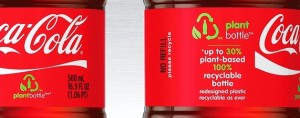
Unveiled at the Copenhagen Climate summit, the new bottle has been found to have a 12 to 19 percent smaller carbon footprint than traditional plastic bottles. In part, that stems from the fact that Coke’s petroleum-based plastic bottles require upwards of 17 million barrels of oil per year to produce, the Pacific Institute, a California environmental group, told The Wall Street Journal.
Plants such as sugar cane and corn are renewable resources, unlike oil. Overall, America uses around 200,000 barrels of oil per day to make plastic, according to a recent article in Smithsonian magazine.
Coke’s move away from plastics follows a nationwide trend in which everything from to-go containers to carpets is being made out of plant-based materials.
The price of oil, safety concerns over the chemicals used in plastics and growing awareness about plastic’s environmental impact have all led to the birth of U.S. companies that utilize crops like corn, sugar beets, wheat, sweet potatoes and rice to make a plastic alternative called polylactic acid, or PLA.
One of those companies is Minnesota-based NatureWorks, founded in 1997. It produces 300 million pounds of a polymer made of renewable resources like the sugars found in plants. “The production of these biopolymers uses less fossil fuel and emits fewer greenhouse gasses than conventional polymers,” the company’s Web site says. The resulting products fashioned from that material can be composted, rather than thrown in a landfill.
Mainstay U.S. companies like Newman’s Own and Wild Oats have also switched to PLA packaging. In 2005, Wal-Mart said it would partner with NatureWorks to use PLA containers for much of the produce it sells, a move the company estimates will save 800,000 barrels of oil per year.
“We felt strongly that everywhere we can get out of petroleum products, we should,” Newman’s Own CEO Peter Meehan told Smithsonian. “No one has ever gone to war over corn.”
PepsiCo, too, has embraced PLA. Its SunChips brand has a new bag, 33 percent of which is made from polylactic acid, The Wall Street Journal said. By April 22, Earth Day, the company said the bags will be 90 percent made from PLA.
Hurdles do remain for a wholesale switch from plastic to plant, however. In order for the new containers to fully biodegrade, they must be sent to a large-scale composting facility. Toss that PLA bottle into the woods, and, just like the plastic alternative, it will likely still be there a few years down the line.
Bottles made entirely out of PLA have also been found to provide a shorter shelf life than the plastic variety, though that problem may soon be addressed. To help combat structural deficiencies, DuPont recently released Biomax Strong, an additive to help strengthen PLA.